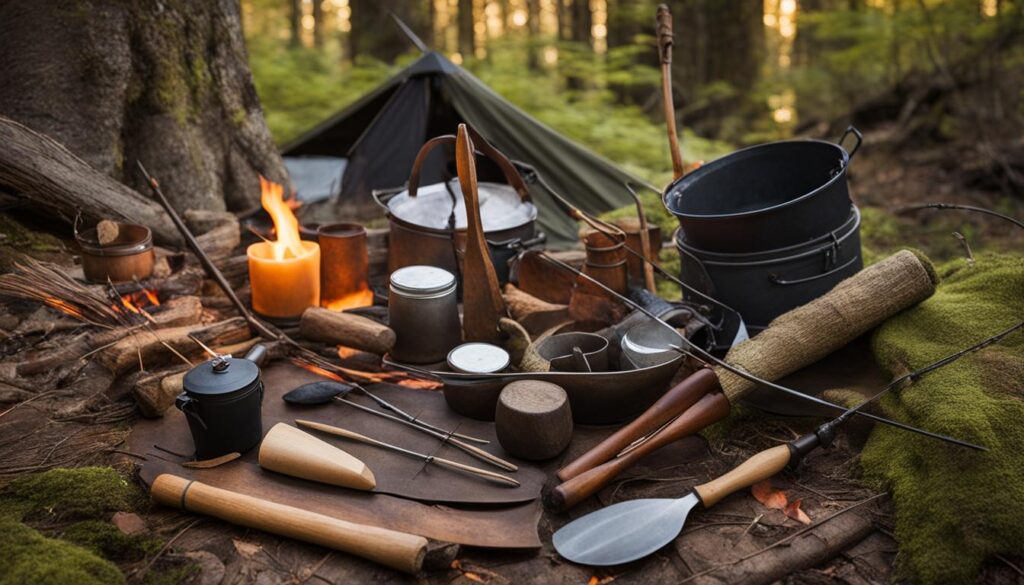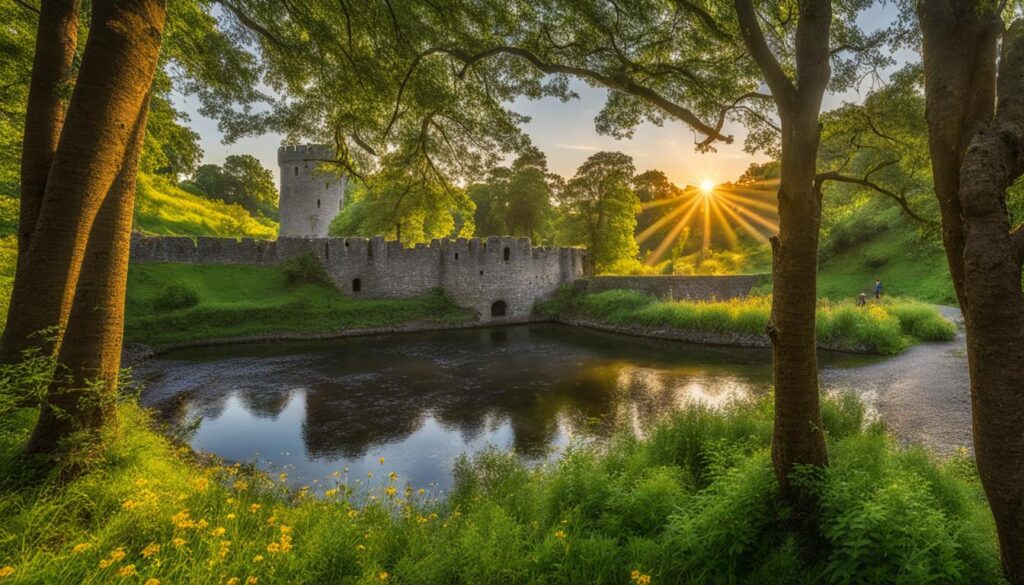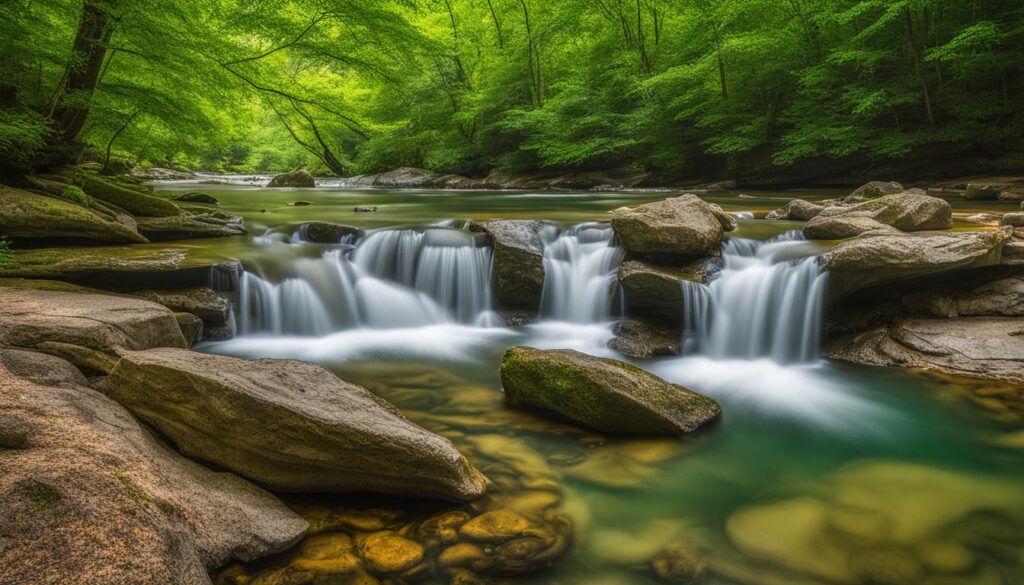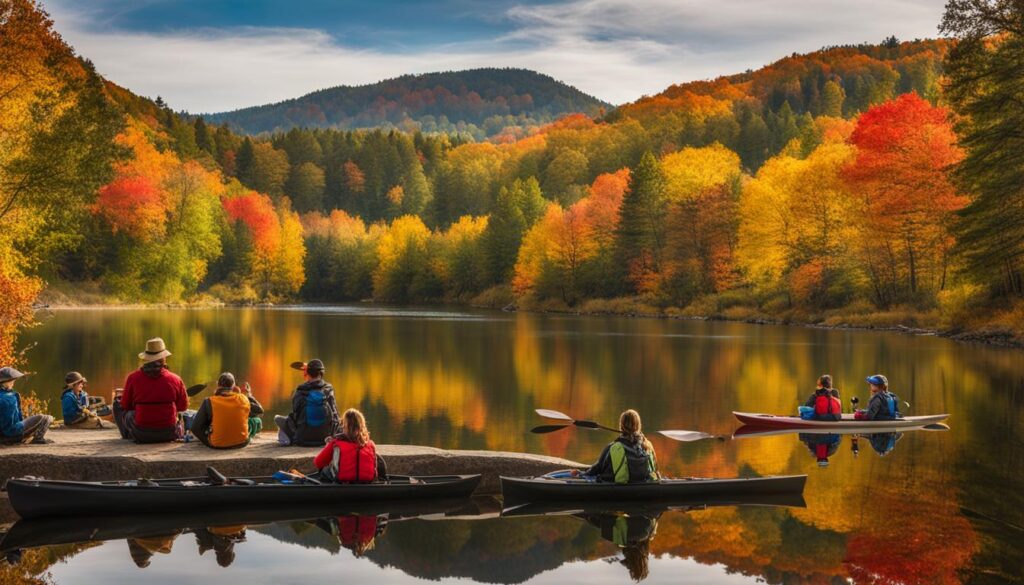Are you ready to disconnect from the hustle and bustle of modern life and immerse yourself in the simplicity of nature? If so, primitive camping might be the perfect adventure for you. In this article, I will explain what primitive camping is, its pros and cons, what you need to bring, the best locations for primitive camping, and how to practice responsible camping. So, let’s dive in and discover the beauty of primitive camping!
Key Takeaways:
- Primitive camping involves camping in remote areas without amenities like bathrooms or picnic tables.
- It offers a closer connection with nature and a more peaceful camping experience.
- Pros include the freedom to choose your destination and access to remote and secluded areas.
- Cons include less overall comfort and the need for basic camping skills.
- Important items to bring include a tent, food supplies, a first aid kit, and backcountry permits or primitive campsite reservations.
Contents
What is Primitive Camping?
Primitive camping is an immersive outdoor experience that takes you away from the bustling modern world and into the serenity of remote natural areas. It involves venturing into the wilderness, far from the amenities and conveniences of civilization, to set up camp and connect with nature on a deeper level.
Unlike traditional camping where designated campgrounds offer amenities like restrooms, picnic tables, and fire pits, primitive camping embraces a simpler, more primitive way of living. It requires self-sufficiency and self-reliance as you bring and set up your own shelter, prepare your own meals, and adapt to the natural surroundings.
In remote areas, far from the noise and distractions of crowds and technology, primitive camping allows you to experience a unique closeness with nature. The absence of modern comforts fosters a sense of solitude and tranquility, providing an opportunity to disconnect from the fast-paced world and immerse yourself in the beauty and stillness of the natural environment.
Independence is a hallmark of primitive camping. It’s a chance to rely on your own skills and resourcefulness to navigate the challenges of outdoor living. From finding the perfect campsite to building a fire, navigating trails, and purifying water, every aspect of primitive camping encourages personal growth and self-reliance.
“In the wilderness, I find solace and a renewed sense of wonder. Primitive camping allows me to strip away the complexities of modern life and bask in the simplicity and beauty of nature.”
In the next section, we’ll explore the pros and cons of primitive camping and discover why so many outdoor enthusiasts are drawn to this back-to-basics camping experience.

Pros and Cons of Primitive Camping
Primitive camping offers a unique and immersive outdoor experience, but it’s important to consider the pros and cons before embarking on this adventure. Let’s explore the benefits and drawbacks of primitive camping:
Benefits of Primitive Camping:
- Freedom to Choose Your Destination: In primitive camping, you have the freedom to choose your own camping location, whether it’s a pristine mountain peak or a serene lakeside.
- Freedom from Common Distractions: Primitive camping allows you to disconnect from the hustle and bustle of everyday life, offering a chance to enjoy the serenity and peace of nature without the distractions of technology.
- Cheaper Alternative to Modern Camping Methods: Primitive camping is a more affordable option compared to traditional campgrounds or RV parks, as there are often little to no fees associated with camping in remote areas.
- Ability to Explore Remote and Scenic Areas: Primitive camping provides the opportunity to venture into remote and less-traveled areas, allowing you to discover hidden gems and enjoy breathtaking natural landscapes.
Drawbacks of Primitive Camping:
- Lack of Luxuries: Primitive camping means leaving behind creature comforts like beds and toilets. You’ll need to adapt to the basic amenities provided by nature.
- Less Overall Comfort: Compared to established campgrounds, primitive camping may offer less comfort in terms of sleeping arrangements, cooking facilities, and access to modern conveniences.
- Need for Self-Sufficiency: Primitive camping requires self-sufficiency in tasks such as starting a fire, pitching a tent, and administering basic first aid. You’ll need to rely on your skills and resources to navigate challenges that may arise.
While primitive camping may not offer luxury and convenience, the challenges it presents can be exciting and rewarding for those with the right skills and mindset. It’s an opportunity to embrace the freedom of nature and immerse yourself in the raw beauty of the great outdoors.

What You’ll Need for Primitive Camping
When planning a primitive camping trip, it is crucial to ensure you have all the necessary supplies and equipment. Here’s a comprehensive packing list of camping essentials to make your primitive camping experience safe and enjoyable:
Tent or Rooftop Camper Tent
A reliable and sturdy tent is essential for providing shelter and protection from the elements. Alternatively, if you have a rooftop camper tent, it offers convenience and saves space in your vehicle.
Food Supplies
Bring enough food supplies for the duration of your camping trip, including non-perishable items such as canned goods, dried fruits, nuts, and energy bars. Don’t forget to pack cooking utensils, a portable stove, and camping cookware for preparing meals.
Water or Water Purification Options
Staying hydrated is crucial in the outdoors. Pack an ample supply of drinking water or opt for water purification methods like water filters or iodine tablets to ensure a safe and clean water source.
First Aid Kit
Accidents can happen, so it’s important to have a well-stocked first aid kit on hand. Include essentials like bandages, antiseptic wipes, pain relievers, insect repellent, and any necessary prescription medications.
Backcountry Permits or Reservations
Before heading out, check if your chosen camping location requires backcountry permits or primitive campsite reservations. This ensures you comply with any regulations and secures your spot in advance.
Additional Camping Essentials
Aside from the aforementioned essentials, consider packing the following items:
- A map of the area to navigate your surroundings
- Sunscreen to protect your skin from harmful UV rays
- Toilet paper and hygiene products
- A sleeping bag for a comfortable night’s sleep
- A reliable pocket knife for various tasks
Prepare for worst-case scenarios by including these items:
- A flashlight for illumination
- Rain gear to stay dry in inclement weather
- Waterproof matches for fire-starting
- A portable backpacking stove for cooking

Where to Go Primitive Camping
Primitive camping offers a unique opportunity to explore remote regions that have been untouched by many others. If you’re looking for the best places for primitive camping, consider these remote camping locations:
- Lost Maples State Natural Area in Texas
- My Old Kentucky Home State Park in Kentucky
- Elephant Butte Lake in New Mexico
- Lake MacBride State Park in Iowa
- Welaka Primitive Campsites in Florida
Each of these primitive camping options offers a different landscape and a chance to experience solitude in the midst of nature. Whether you’re seeking rugged mountains, serene lakes, or dense forests, there’s a remote camping location that will fulfill your desire for seclusion and tranquility.

Embark on a primitive camping adventure in one of these scenic destinations and reconnect with nature in its purest form. Create lasting memories as you camp under the starry sky and wake up to the sound of birds chirping. Escape the hustle and bustle of everyday life and immerse yourself in the serenity of these remote camping locations.
Leave No Trace Ethics in Primitive Camping
In primitive camping, responsible camping and preserving the land go hand in hand. By adhering to Leave No Trace principles, we can ensure that the wilderness remains pristine and protected for future generations to enjoy. Let’s take a look at some key principles for responsible primitive camping:
- Pack Out Garbage: It is essential to pack out all garbage and leave no trace of your presence. Carry a designated trash bag and dispose of waste properly when you reach a designated disposal area.
- Camping on Durable Surfaces: To minimize impact on the land, camp on durable surfaces or previously-used areas whenever possible. Avoid pitching tents or setting up camp in fragile ecosystems or vegetation.
- Dispose of Waste Properly: Human waste should be disposed of following specific guidelines. Bury waste in small holes at least 200 feet away from any water sources or trails. Alternatively, carry out waste using appropriate equipment like waste bags or portable toilets.
- Respect Wildlife: Maintain a safe distance from wildlife and observe them from afar. Do not feed or approach animals, as it disrupts their natural behavior and can be dangerous.
- Minimize Campfire Impact: If campfires are allowed, use existing fire rings or fire pits whenever possible. Keep fires small and ensure they are completely extinguished before leaving the campsite.
- Be Considerate of Other Campers: Respect the tranquility and solitude of other campers by minimizing noise and preserving the peacefulness of the surroundings.
- Leave Nature as You Found It: Before leaving, restore the campsite to its natural state by removing all traces of your visit. The goal is to leave the land as you found it, without any evidence of human presence.
By following these Leave No Trace ethics, we can enjoy the beauty of primitive camping while also preserving and protecting the natural environment for future generations.

Preparations for Primitive Camping
Before embarking on a primitive camping trip, it is crucial to inform your family about your plans and the location where you’ll be camping. This not only ensures their awareness but also allows them to track your whereabouts if needed. Safety should always be a priority, and keeping your loved ones informed is an essential step.
Packing provisions is another important aspect of preparing for primitive camping. Consider factors such as the length of your trip, the essential supplies you’ll need, any specific health needs, the weather forecast, and your nutritional requirements. By planning ahead and packing accordingly, you can ensure a smooth and enjoyable camping experience.
Additionally, it is essential to familiarize yourself with the local regulations and rules pertaining to primitive camping. Each camping location may have specific guidelines that you need to adhere to. By knowing and understanding these regulations, you can ensure both compliance and safety during your camping trip.
FAQ
What is primitive camping?
Primitive camping is camping in remote areas without amenities like bathrooms, picnic tables, trash cans, or any other man-made structures. It allows for a closer connection with nature and a more peaceful camping experience.
What are the pros and cons of primitive camping?
The pros of primitive camping include the freedom to choose your destination, a more affordable alternative to modern camping methods, and access to remote and secluded areas. However, cons include less overall comfort and the need for basic camping skills.
What do I need for primitive camping?
Important items to bring on a primitive camping trip include a tent or rooftop camper tent, food supplies, a first aid kit, and backcountry permits or primitive campsite reservations. Other essentials include a map, sunscreen, toilet paper, a sleeping bag, and a pocket knife.
Where are the best places to go primitive camping?
Some popular primitive camping locations in the US include Lost Maples State Natural Area in Texas, My Old Kentucky Home State Park in Kentucky, Elephant Butte Lake in New Mexico, Lake MacBride State Park in Iowa, and Welaka Primitive Campsites in Florida.
How can I practice Leave No Trace ethics in primitive camping?
It’s important to pack out all garbage, dispose of waste properly, camp on durable surfaces, and follow specific guidelines for burying human waste or carrying it out. Responsible camping ensures that the wilderness remains intact for future generations to enjoy.
What preparations should I make for primitive camping?
Before embarking on a primitive camping trip, inform your family about your plans and the location where you’ll be camping. Pack provisions based on trip length, essential supplies, health needs, and weather forecast. Understand local regulations and rules to ensure compliance and safety.






